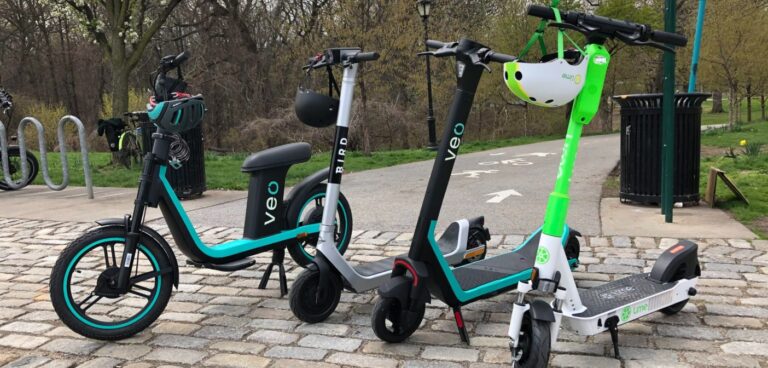The New York City Department of Transportation (NYCDOT) has announced the official launch of the US city’s e-scooter pilot.
Bird, Lime and Veo, the three companies participating in the two-year pilot, will bring up to 3,000 e-scooters to the East Bronx during Phase 1, which started yesterday (17 August 2021), with an increase to as many as 6,000 in the second phase next year.
NYCDOT and each company underwent a community engagement process to site e-scooter parking corrals and educate the public about the pilot, including its safety, equity, and accessibility components. These included meetings with community boards, local BIDs, nearby medical facilities, and more.
“This is an exciting announcement as we officially bring shared micromobility to the East Bronx community,” said NYCDOT commissioner Hank Gutman. “With safety as our top priority, we look forward to a continued collaboration with Bird, Lime and Veo, elected officials and local Bronx communities to make e-scooter share an effective, convenient, and equitable way to get around.”
Mandated by city council legislation passed in 2020, New York City’s e-scooter pilot is expected offer a new shared mobility option in the eastern Bronx pilot zone; in Phase One this year, neighbourhoods from Eastchester and Co-op City to Morris Park are included.
In 2022, Phase Two will include neighbourhoods farther south, including Throggs Neck and Soundview. In total, the zone is an 18-square-mile area home to a diverse population of 570,000 residents, including 25,000 New York City Housing Authority (NYCHA) residents.
Community meetings over the last few months have also led to the installation of nearly 90 e-scooter corrals on busy corridors within the pilot zone. Riders wanting to park in areas with corrals, must return their e-scooter to a corral.
In other parts of the zone, riders can park on the sidewalk, against the kerb and out of the pedestrian path of travel. The corral locations are available in online maps for each of the three community boards served by the pilot.
In addition to community engagement, Bird, Lime and Veo have also collectively held almost 15 demonstrations – serving more than 100 potential customers – and given away dozens of helmets, which are strongly encouraged – although not legally required – for riders.
The pilot is a result of a Request for Expressions of Interest (RFEI) issued by NYCDOT in October 2020 and the pilot zones were designed to not overlap with neighbourhoods targeted by Citi Bike as part of the bike-share company’s current expansion plan. The pilot service area will also be geo-fenced to prevent e-scooters from leaving.
Companies were evaluated on past performance elsewhere as well as RFEI questionnaire responses about equipment, accessible options, pricing, equity policies and discounts, features, and a launch schedule. Each of the companies has shown a sizeable presence in other US cities and had the highest performances measured in the evaluation process. Among the selected companies, Lime already has experience in New York City, having participated in the City’s dockless bike-share pilot in the Rockaways and on Staten Island during 2018 and 2019.
NYCDOT and each company have entered into demonstration agreements that require high standards and allow for strong enforcement mechanisms governing service provision and operator performance. The pilot will allow NYCDOT to test a variety of strategies to manage sidewalk clutter, including dedicated parking corrals and using real time e-scooter data to ensure parking compliance.
Furthermore, NYCDOT will complete an evaluation of the pilot that will examine usage, trip patterns, safety, e-scooter parking behaviour, system accessibility and other factors. It will also evaluate the pilot on how well it is providing equitable coverage across the entire pilot zone, with explicit requirements that companies also adhere to NYCDOT’s Vision Zero safety goals.
Some safety and accessibility features include: in-app safety tests for new riders; a ‘beginner mode’ that requires that a user’s first 30 minutes of trips are limited to 10mph and cannot occur in darkness or overnight; voluntary socially distanced in-person lessons; a rider accountability policy to prevent underage riding; accessible vehicle options, such as seated scooters and wheelchair attachments; and
regular meetings with NYCDOT, Mayor’s Office for People with Disabilities, and disability groups on accessibility issues.
E-scooters in the pilot can only be unlocked using each company’s smartphone app and are limited to riders 18 and older. When announced in April as the participating companies, Bird, Lime and Veo unveiled pricing plans that will allow most rides for under US$5 (£3.60). All three companies will provide discounted pricing for low-income New Yorkers enrolled in federal and state assistance programmes.
The three companies have also hired locally, and have guaranteed a range of consumer and labour protections. Further community enhancing measures include: providing additional in-app language options other than English; engaging with the disability community on accessible options; and stationing employees at corral locations to educate the public and address operational issues during rollout; offering customer agreements with no binding arbitration or class action waiver provisions; and hiring salaried employees – with no ‘gig labour’ permitted.
Near the end of the two-year pilot, DOT will issue a legally mandated report that will include agency recommendations.





